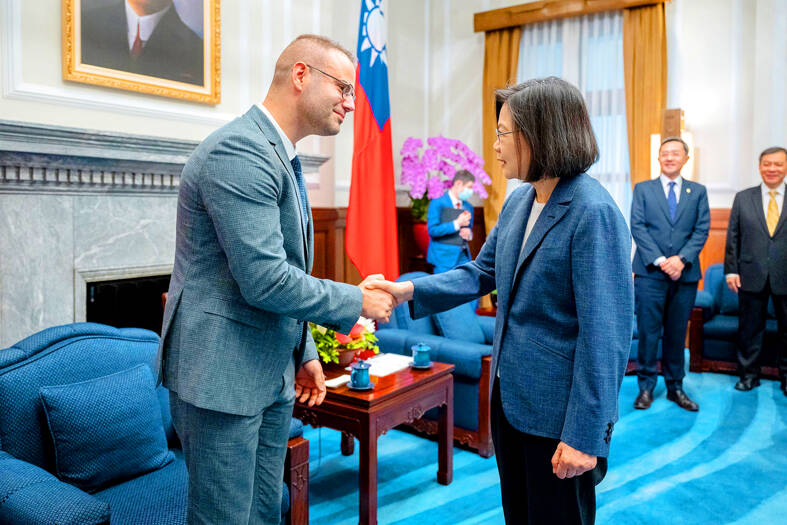Taiwan can learn from Israel’s experience in all-out defense, and bolster cooperation in fields including economics and cybersecurity, President Tsai Ing-wen (蔡英文) said during a meeting with an Israeli delegation yesterday.
The delegation, comprising six Israeli lawmakers, is in Taiwan for a six-day visit until Tuesday next week.
As military service is mandatory for all Israeli citizens, Taiwan can learn much from the country to promote its own all-out national defense, Tsai said.

Photo courtesy of the Presidential Office via CNA
Taiwan and Israel are facing challenges and threats posed by authoritarianism, but remain calm and composed, she said.
The two countries not only continue to prosper and grow economically and socially, but have also developed strong social resilience, she added.
Taiwan and Israel are important trading partners with complementary industrial advantages, Tsai said, adding that she hopes the two sides can work together to create a safer and more resilient democratic supply chain.
She also called for closer cooperation in cybersecurity, as Israel is a world leader in the field.
This year marks the 30th anniversary of the inauguration of the Israel Economic and Cultural Office in Taipei and the Taipei Economic and Cultural Office in Tel-Aviv, Tsai said.
Over the three decades, Taiwan and Israel have signed 32 agreements in science and technology, healthcare, aerospace and other areas, which have yielded fruitful outcomes, she said.
The two sides in May signed the Agreement on a Working Holiday Scheme, which promotes exchanges between young people from both countries and new opportunities for cooperation, she said.
Israeli Legislator Yorai Lahav Hertzanu said that Taiwan and Israel have a robust relationship based on their shared interests, values and ideas.
“Our societies both believe in liberal democratic values and equality, are resilient and innovative, and have vibrant civil society organizations,” Lahav Hertzanu said.
The two representative offices are crucial institutions that promote civilian cooperation in the fields of medicine and healthcare, the economy, technology, the environment and agriculture, he said.
Taiwan is an important economic partner, he said, adding that he hopes more Taiwanese businesses would invest in Israel, such as opening research and development centers in the country.
A combination of Taiwan’s strengths in hardware and Israel’s advantages in software can stimulate greater cooperation, he said.
Lahav Hertzanu also praised Taiwan’s global leadership on gender equality.
The achievement sent a clear and direct message to young people in Taiwan and around the world that “people can chase and achieve their dreams; gender is not an obstacle,” he said.

The US government has signed defense cooperation agreements with Japan and the Philippines to boost the deterrence capabilities of countries in the first island chain, a report by the National Security Bureau (NSB) showed. The main countries on the first island chain include the two nations and Taiwan. The bureau is to present the report at a meeting of the legislature’s Foreign Affairs and National Defense Committee tomorrow. The US military has deployed Typhon missile systems to Japan’s Yamaguchi Prefecture and Zambales province in the Philippines during their joint military exercises. It has also installed NMESIS anti-ship systems in Japan’s Okinawa

TRAGEDY STRIKES TAIPEI: The suspect died after falling off a building after he threw smoke grenades into Taipei Main Station and went on a killing spree in Zhongshan A 27-year-old suspect allegedly threw smoke grenades in Taipei Main Station and then proceeded to Zhongshan MRT Station in a random killing spree that resulted in the death of the suspect and two other civilians, and seven injured, including one in critical condition, as of press time last night. The suspect, identified as a man surnamed Chang Wen (張文), allegedly began the attack at Taipei Main Station, the Taipei Fire Department said, adding that it received a report at 5:24pm that smoke grenades had been thrown in the station. One man in his 50s was rushed to hospital after a cardiac arrest

ON ALERT: Taiwan’s partners would issue warnings if China attempted to use Interpol to target Taiwanese, and the global body has mechanisms to prevent it, an official said China has stationed two to four people specializing in Taiwan affairs at its embassies in several democratic countries to monitor and harass Taiwanese, actions that the host nations would not tolerate, National Security Bureau (NSB) Director-General Tsai Ming-yen (蔡明彥) said yesterday. Tsai made the comments at a meeting of the legislature’s Foreign Affairs and National Defense Committee, which asked him and Minister of National Defense Wellington Koo (顧立雄) to report on potential conflicts in the Taiwan Strait and military preparedness. Democratic Progressive Party (DPP) Legislator Michelle Lin (林楚茵) expressed concern that Beijing has posted personnel from China’s Taiwan Affairs Office to its

PUBLIC SAFETY: The premier said that security would be tightened in transport hubs, while President Lai commended the public for their bravery The government is to deploy more police, including rapid response units, in crowded public areas to ensure a swift response to any threats, President William Lai (賴清德) said yesterday after a knife attack killed three people and injured 11 in Taipei the previous day. Lai made the remarks following a briefing by the National Police Agency on the progress of the investigation, saying that the attack underscored the importance of cooperation in public security between the central and local governments. The attack unfolded in the early evening on Friday around Taipei Main Station’s M7 exit and later near the Taipei MRT’s Zhongshan